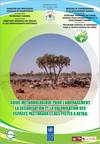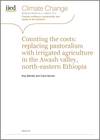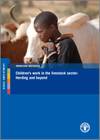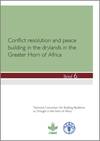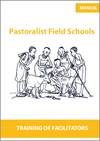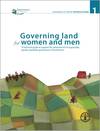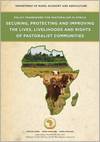The N’djamena Declaration, adopted by Ministers responsible for livestock and security from a number of African countries, calls upon the Sahelian, West African, Central African, North African and international communities to unite in a spirit of peace, tolerance and sharing, in order to promote peace and sustainable development for the Saharo-Sahelian areas. Only by supporting pastoralism, regional stability can be maintained.
Year of publication: 2013Organization: Individual authors
Topic: Participation
Language: العربية, English, Français
Type of document: Policies and legislation
Geographical coverage: North Africa, West Africa, Central Africa
Le présent guide vise à contribuer à la mise en œuvre réussie des programmes définis par la Politique Nationale de Développement durable de l'Elevage (PNDEL) et notamment le Programme de sécurisation des zones d'intensification des productions animales.
De manière spécifique, le guide méthodologique ambitionne de mettre à la disposition des acteurs un outil opérationnel de réalisation et de gestion durable des zones pastorales et des pistes à bétail en suivant un processus approprié dans la conduite des opérations d'identification, d'aménagement, de sécurisation et de valorisation des espaces pastoraux et des pistes à bétail.
Ces objectifs sont déclinés en quatre (4) grands axes : l’identification des zones pastorales et des pistes à bétail ; l'aménagement des zones pastorales ; la sécurisation des zones pastorales et des pistes à bétail ; et la valorisation des zones pastorales et des pistes à bétail.
Par ailleurs, la stratégie de mise en œuvre du guide traite successivement des principes de la mise en œuvre, de la diffusion du guide et de la formation des utilisateurs, du financement, du suivi-évaluation et formule des recommandations.
Year of publication: 2013Organization: Individual authors, United Nations Development Programme (UNDP)
Topic: Economy, Environmental services, Resilience
Language: Français
Type of document: Technical
Geographical coverage: West Africa
This study calculates the economic benefits and opportunity costs of three alternative agricultural systems – pastoral livestock production versus cotton and sugar cane estates on the banks of the Awash River in north-eastern Ethiopia. These traditional pastoral grazing areas were converted into large-scale irrigated cotton and sugar plantations in the 1960s. The findings suggest that pastoralism is a surer investment in the longer term resilience and economic stability of Ethiopia’s dry lowlands.
Year of publication: 2013Organization: International Institute for Environment and Development (IIED)
Topic: Economy
Language: English
Type of document: Scientific
Geographical coverage: Eastern Africa
Child labour in pastoralist communities is a complex issue. Many families rely on their children to herd their livestock. They recognize the importance of education, but education systems in pastoral areas are limited, of poor quality and often not suited to pastoral way of life. While herding, children can be exposed to loneliness, physical and mental burdens and dangerous environments. This study has a special focus on child (herding) activities with regard to livestock in pastoralist communities and lists solutions to prevent child labour.
View also the 4-page brief of the study.
Year of publication: 2013Organization: Food and Agriculture Organization of the United Nations (FAO)
Topic: Gender and youth
Language: English
Type of document: Technical, Scientific
Geographical coverage: Global
This brief analyses policies on conflict management and peace-building in the Greater Horn of Africa region (Djibouti, Ethiopia, Kenya, Somalia, Sudan, South Sudan and Uganda). It lists key priorities for interventions including developing and implementing integrated peace building and security frameworks, reforming local governance in pastoral areas, strengthening state–citizen relations and developing a common vision and a long-term strategy to support pastoralist development.
Year of publication: 2013Organization: Food and Agriculture Organization of the United Nations (FAO)
Topic: Conflict
Language: English
Type of document: Policies and legislation
Geographical coverage: Eastern Africa
The Pastoralist Field School approach is an adaptation of the innovative, participatory and interactive learning approach; Farmer Field Schools.
Pastoralist Field Schools are essentially schools without walls that introduce new technological innovations while building on indigenous knowledge. Through experiential and participatory learning techniques applied in a group setting, with regular meetings over a longer time period, pastoralists learn how to analyse their situation and make informed decisions about their livelihood practices and resource use strategies. The approach empowers pastoralists rather than advising them on what to do.
This training manual is designed to be used by master trainers during the training of facilitators.
Year of publication: 2013Organization: Food and Agriculture Organization of the United Nations (FAO)
Topic: Organization, Social services
Language: English
Type of document: Technical
Geographical coverage: West Africa, Central Africa, Eastern Africa, Global
Gender equality is one of the ten core principles of the Voluntary Guidelines on the Responsible Governance of Tenure of Land, Fisheries and Forests in the Context of National Food Security. This guide aims to assist in its implementation through the achievement of responsible gender-equitable governance of land tenure. The guide focuses on equity and on how land tenure can be governed in ways that address the different needs and priorities of women and men. Gender-equitable go vernance of land tenure ensures that women and men can participate equally in their relationships to land, through both formal institutions and informal arrangements for land administration and management. The guide provides advice on mechanisms, strategies and actions that can be adopted to improve gender equity in the processes, institutions and activities of land tenure governance.
Year of publication: 2013Organization: Food and Agriculture Organization of the United Nations (FAO)
Topic: Gender and youth, Land, Participation
Language: English
Type of document: Technical
Geographical coverage: Global
The Policy Framework for Pastoralism in Africa, as presented in this report, is the first continent-wide policy initiative aiming to secure, protect and improve the lives of African pastoralists. Pastoralists make crucial – but often undervalued – contributions to economies in Africa in terms of their production systems, culture, and animal and plant resources. Yet human development and food security indicators in many pastoral areas are among the lowest on the continent. The objectives of the framework are to protect the lives, livelihoods and rights of pastoral people, and to reinforce the contribution of pastoral livestock to national, regional and continent-wide economies.
Year of publication: 2013Organization: Individual authors
Topic: Economy, Food security, Indigenous peoples, Social services
Language: English
Type of document: Policies and legislation
Geographical coverage: North Africa, West Africa, Central Africa, Eastern Africa, Southern Africa



